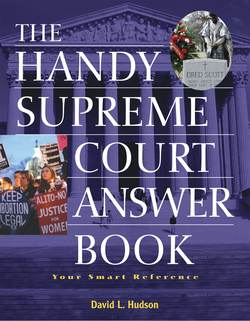Читать книгу The Handy Supreme Court Answer Book - David L Hudson - Страница 184
На сайте Литреса книга снята с продажи.
DECISIONS What famous decision in the 1790s led to a constitutional amendment?
ОглавлениеThe Court decided 4–1 in Chisholm v. Georgia (1793) that the state of Georgia could be sued by a South Carolina citizen. This decision caused great uproar and led to the Congressional passage of the Eleventh Amendment, which generally prohibits states from being hauled into court by individuals (at least for monetary damages).
The case arose because the state of Georgia did not pay for supplies to South Carolina merchant Robert Farquhar. The state refused to pay Farquhar because he was a Loyalist (loyal to England). Georgia made the legal argument that it was immune from suit because it was a state that could not be sued by a citizen of another state. After Farquhar died, the executor of his estate, Alexander Chisholm (who also was from South Carolina), then sued the state in federal court for nearly $70,000. Georgia, believing it had immunity from a suit by a South Carolina citizen, argued that the federal court did not have jurisdiction.
The Court ruled 4–1 that Georgia could be sued. The justices in the majority focused on the explicit language in Article III of the Constitution, which provides that “the judicial power of the United States shall extend to controversies between a state and citizens of another state.”
Congress adopted the Eleventh Amendment in 1795 and it was ratified in 1798. It provides: “The Judicial power of the United States shall not be construed to extend to any suit in law or equity, commenced or prosecuted against one of the United States by Citizens of another State, or by Citizens or Subjects of any Foreign State.”
